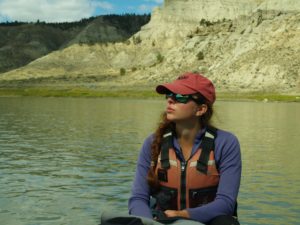 “Land is many things to many people,” writes Richard Manning in his book, Rewilding the West. What land means to one individual is a matter of perspective. It is very hard to find a single person in the world with the exact same perspective as you about much of anything – including the meaning and value of land.
“Land is many things to many people,” writes Richard Manning in his book, Rewilding the West. What land means to one individual is a matter of perspective. It is very hard to find a single person in the world with the exact same perspective as you about much of anything – including the meaning and value of land.
I believe that a person’s perspective of land is influenced by many things: their childhood, upbringing, family, role models, peers, education, and travel. The meaning of a specific plot of land, the earth in general, or just spectacular tourist attractions will vary for everyone. Each new life experience a person has could somehow, if only in a minor way, affect how they value land.
So this means that different people with different upbringings, life experiences, feelings, concerns, and emotions will have very different perspectives of the land. The struggle is, how does a person step out of their own perspective to at least recognize, if not agree with, another’s perspective?
I think there will always be conflict over land, but awareness of this idea of perspective may bring cooperation between people with different perspectives of what land means to them. My thoughts on how and why perspective influences what land means to a person and how land is used have resonated clear and strong on our WRFI
course as we have listened to a number of people speak to us about their passion for the Montana landscape. Each speaker spoke clearly of their personal perspective on the land that they work, manage, and/or simply just love.
Lou Bruno, a member of the Glacier-Two-Medicine-Alliance (a local grass-roots preservation alliance), was very passionate about what land means to him. Land (wilderness in his case) is his “safe-haven” from the brutalities of the world – from the pain (from other humans) in his past. He was clear that he will do everything in his power to radically preserve as much wilderness as possible. When he shared his life history, his childhood, his upbringing – it was clear that his radical passion to preserve wilderness stems from the fact that, in a sense, the land had preserved him. It seems Lou’s perspective on the land comes from a space of struggle and gratitude, deeply rooted in his life experiences.
We also met with Sheldon – The Blackfoot Buffalo herd manager. Sheldon’s relationship with the land seemed much more lighthearted than Lou’s. His perspective was not as clearly shaped by personal pain, but was informed by his culture. In Blackfoot culture the land is sacred – it is their belief that humans live with the land, not off of it. Sheldon expressed that he and his family still live with many of the traditional views of land that his ancestors did. But he also lives in the modern world and manages the Buffalo herd for his tribe living in today’s culture. Sheldon seemed to have the perspective of a 21st century Blackfoot: balancing and valuing his traditional culture with current needs and the realities of the land.
And lastly, we visited the Lane Yeager, a lifelong worker of the land that had supported his family for generations. The Yeager Ranch was located on Montana’s Rocky Mountain Front. Lane definitely conveyed his love of the beautiful land, the ranching lifestyle and his beautiful home state. He seemed to be as proud of the Montana land as the two other speakers I described above. However, Lane’s perspective of the land is much more informed by economics. He told us, “It’s all about turning grass into cash,” just ten minutes into our meander through his grazing land. At first I was taken aback by his blunt statement, but after listening to Lane talk more in depth about his life and his ranching practices, after hearing to him talk about maintaining his family’s ranching legacy, I gained insight into where his perspective came from. The land is foremost his livelihood – how he supports his family – but it is also a beautiful place with wild landscapes.
Differences in perspective are often the origin of land conflicts. Is it possible to broaden our lens and truly understand a competing vision of the land? I think we can! It starts with a personal challenge to internalize the concept of perspective. And maybe, even if this understanding doesn’t immediately change interactions on a political or economic level, it will at least teach you how to be a good neighbor.